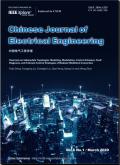A Multitime-Scale Deep Learning Model for Lithium-ion Battery Health Assessment Using Soft Parameter-sharing Mechanism
IF 3.5
Q1 Engineering
引用次数: 0
Abstract
Efficient assessment of battery degradation is important to effectively utilize and maintain battery management systems. This study introduces an innovative residual convolutional network (RCN)-gated recurrent unit (GRU) model to accurately assess health of lithium-ion batteries on multiple time scales. The model employs a soft parameter-sharing mechanism to identify both short-and long-term degradation patterns. The continuously looped利用软参数共享机制评估锂离子电池健康状况的多时标深度学习模型
有效评估电池退化对于有效利用和维护电池管理系统非常重要。本研究引入了一种创新的残差卷积网络(RCN)--门控递归单元(GRU)模型,可在多个时间尺度上准确评估锂离子电池的健康状况。该模型采用软参数共享机制来识别短期和长期退化模式。通过提取连续循环的 $Q(V)、T(V)、\frac{\mathrm{d}Q}{\mathrm{d}V}$ 和 $\frac{\mathrm{d}T}{\mathrm{d}V}$,形成四通道图像,RCN 可以从中自动提取特征,GRU 可以捕捉时间特征。通过设计软参数共享机制,该模型可在双时间尺度上无缝预测容量和剩余使用寿命(RUL)。所提出的方法在由 124 个电池组成的大型麻省理工学院-斯坦福大学数据集上进行了验证,结果表明,该方法具有很高的准确性,容量平均绝对误差为 0.004 77,剩余使用寿命平均绝对误差为 83。此外,对部分电压片段的研究表明,所提方法在各种电压范围内都具有良好的性能。具体而言,在 2.8-3.2 V 的部分电压段,容量的均方根误差为 0.010 7,RUL 的均方根误差为 140。
本文章由计算机程序翻译,如有差异,请以英文原文为准。
求助全文
约1分钟内获得全文
求助全文
来源期刊

Chinese Journal of Electrical Engineering
Energy-Energy Engineering and Power Technology
CiteScore
7.80
自引率
0.00%
发文量
621
审稿时长
12 weeks
 求助内容:
求助内容: 应助结果提醒方式:
应助结果提醒方式:


